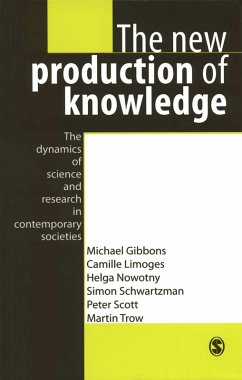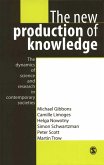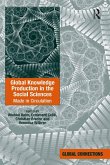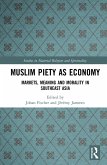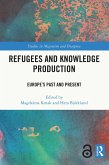In this provocative and broad-ranging work, the authors argue that the ways in which knowledge - scientific, social and cultural - is produced are undergoing fundamental changes at the end of the twentieth century. They claim that these changes mark a distinct shift into a new mode of knowledge production which is replacing or reforming established institutions, disciplines, practices and policies.
Identifying features of the new mode of knowledge production - reflexivity, transdisciplinarity, heterogeneity - the authors show how these features connect with the changing role of knowledge in social relations. While the knowledge produced by research and development in science and technology is accorded central concern, the authors also outline the changing dimensions of social scientific and humanities knowledge and the relations between the production of knowledge and its dissemination through education.
Identifying features of the new mode of knowledge production - reflexivity, transdisciplinarity, heterogeneity - the authors show how these features connect with the changing role of knowledge in social relations. While the knowledge produced by research and development in science and technology is accorded central concern, the authors also outline the changing dimensions of social scientific and humanities knowledge and the relations between the production of knowledge and its dissemination through education.
Dieser Download kann aus rechtlichen Gründen nur mit Rechnungsadresse in A, D ausgeliefert werden.
`It is a significant book... is recommended as highly readable, for policy makers, R&D planners, educationalists, graduate students, as well as reflective scientists' - Higher Education Policy
`Thought-provoking in its identification of issues that are global in scope' - Choice
`Sociology of knowledge in the borderlands of cyberspace' - Jesse Ausubel, Director, Program for the Human Environment, Rockefeller University
`By their insightful identification of the recent social transformation of knowledge production, the authors have been able to assert new imperatives for policy instructions. The lessons of the book are deep' - Alexis Jacquemin, Universite Catholique de Louvain and adviser to Foreign Studies Unit, European Commission
`Should we celebrate the emergence of a `post-academic' mode of postmodern knowledge production for the post-industrial society of the 21st century? Or should we turn away from it with increasing fear and loathing as we also uncover its contradictions. A generation of enthusiasts and/or critics will be indebted to the team of authors for exposing so forcefully the intimate connections between all the cognitive, educational, organizational and commercial changes that are together revolutionizing the sciences, the technologies and the humanities. This book will surely spark off a vigorous and fruitful debate about the meaning and purpose of knowledge in our culture' - Professor John Ziman, University of Bristol
`This book is a timely contribution to current discussion on the breakdown of and need to renegotiate the social contract between science and society that Vannevar Bush and likeminded architects of science policy constructed immediately after World War II. It goes far beyond the usual scattering of fragmentary insights into changing institutional landscapes, cognitive structures, or quality control mechanisms of present day science, and their linkages with society at large. Tapping a wide variety of sources, the authors provide a coherent picture of important new characteristics that, taken altogether, fundamentally challenge our traditional notions of what academic research is all about. This well-founded analysis of the social redistribution of knowledge and its associated power patterns helps articulate what otherwise tends to remain an - albeit widespread - intuition. Unless they adapt to the new situation, universities in future will find the centres of gravity of knowledge production moving even further beyond their ken. Knowledge of the social and cognitive dymanics of science in research is much needed as a basis of science and technology policy-making. The New Production of Knowledge does a lot to fill this gap. Another unique feature is its discussion of the humanities, which are usually left out in works coming out of the social studies of science' - Aant Elzinga, Univeristy of Goteborg
`Thought-provoking in its identification of issues that are global in scope' - Choice
`Sociology of knowledge in the borderlands of cyberspace' - Jesse Ausubel, Director, Program for the Human Environment, Rockefeller University
`By their insightful identification of the recent social transformation of knowledge production, the authors have been able to assert new imperatives for policy instructions. The lessons of the book are deep' - Alexis Jacquemin, Universite Catholique de Louvain and adviser to Foreign Studies Unit, European Commission
`Should we celebrate the emergence of a `post-academic' mode of postmodern knowledge production for the post-industrial society of the 21st century? Or should we turn away from it with increasing fear and loathing as we also uncover its contradictions. A generation of enthusiasts and/or critics will be indebted to the team of authors for exposing so forcefully the intimate connections between all the cognitive, educational, organizational and commercial changes that are together revolutionizing the sciences, the technologies and the humanities. This book will surely spark off a vigorous and fruitful debate about the meaning and purpose of knowledge in our culture' - Professor John Ziman, University of Bristol
`This book is a timely contribution to current discussion on the breakdown of and need to renegotiate the social contract between science and society that Vannevar Bush and likeminded architects of science policy constructed immediately after World War II. It goes far beyond the usual scattering of fragmentary insights into changing institutional landscapes, cognitive structures, or quality control mechanisms of present day science, and their linkages with society at large. Tapping a wide variety of sources, the authors provide a coherent picture of important new characteristics that, taken altogether, fundamentally challenge our traditional notions of what academic research is all about. This well-founded analysis of the social redistribution of knowledge and its associated power patterns helps articulate what otherwise tends to remain an - albeit widespread - intuition. Unless they adapt to the new situation, universities in future will find the centres of gravity of knowledge production moving even further beyond their ken. Knowledge of the social and cognitive dymanics of science in research is much needed as a basis of science and technology policy-making. The New Production of Knowledge does a lot to fill this gap. Another unique feature is its discussion of the humanities, which are usually left out in works coming out of the social studies of science' - Aant Elzinga, Univeristy of Goteborg

